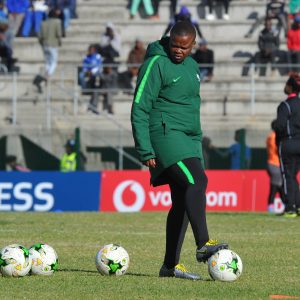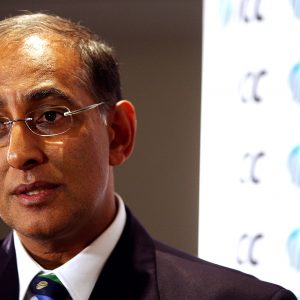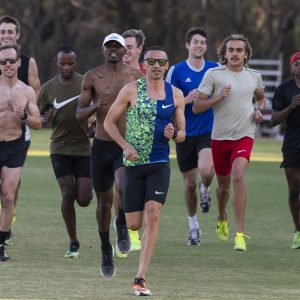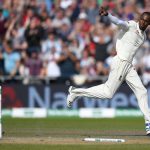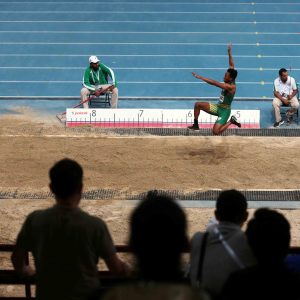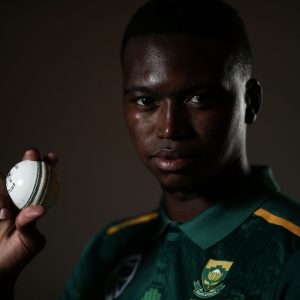Long Read | Solomzi Nqweni learns to walk again
Every time the road looks clear for the Eastern Cape cricketer, potholes appear out of nowhere. But his outlook remains positive, even after his own immune system tried to kill him.
Author:
19 October 2020

We can say with certainty that there are two New Zealand natives who are glad England won the 2019 ICC World Cup final. One is Ben Stokes, the do-it-all superstar from Christchurch who hauled his adopted nation to glory as if steered by divine might. The other is Callum Mackaness, a club cricketer from Wellington who might not have saved the life of his friend Solomzi Nqweni if the Black Caps had been victorious in the golden dusk of Lord’s Cricket Ground.
Mackaness plays down his significance in this story. He’s half right. There are many people who performed tasks great and small that have helped give a young man a second chapter. But Solo, as Nqweni prefers to be called, wouldn’t be here to tell it without his Kiwi mate, and Stokes.
“I’ve always wanted to be a professional cricketer,” Nqweni says, speaking most of his words with a beaming smile. The inflections and pauses carry a rhythmic quality to them, interspersing a quick tempo. He’s enjoying himself. Telling this tale is not a burden. It’s a gift.
Related article:
It begins in the middle-class suburb of Lorraine, about 14km west of Port Elizabeth. Surrounded by wide streets and plenty of parks, Nqweni had room to cultivate an interest in sport not shared by his three older sisters or parents.
He spent his early years obsessing over the great AC Milan side of the 2000s. At Callies Football Club he mimicked Clarence Seedorf, Kaka and Filippo Inzaghi. But it was Andriy Shevchenko he loved most of all, devoting class projects to the Ukrainian goal-machine.
His head was turned while waiting for his parents to collect him from school. A cricket match on an adjacent field required an extra set of hands. Without considering the mechanics of the game, he obliged.
“It was love at first ball,” he says. “I caught on quickly. I knew my life would revolve around it from that point.”
From there, his journey appeared to be a series of green lights and smooth tarmac. He attended Grey High School in Port Elizabeth, a factory for sporting talent that has produced more Proteas cricketers than any other school in the country. By 13, he was representing Eastern Province. By 15, he was a regular at national training weeks.
In 2012, he took part in the Under-19 World Cup in Australia, adding genuine pace and an aggressive mindset to the bowling attack. Though he would only bowl 22.4 overs across three matches in the tournament, he got a glimpse of his future. The journey mapped ahead. An open road.
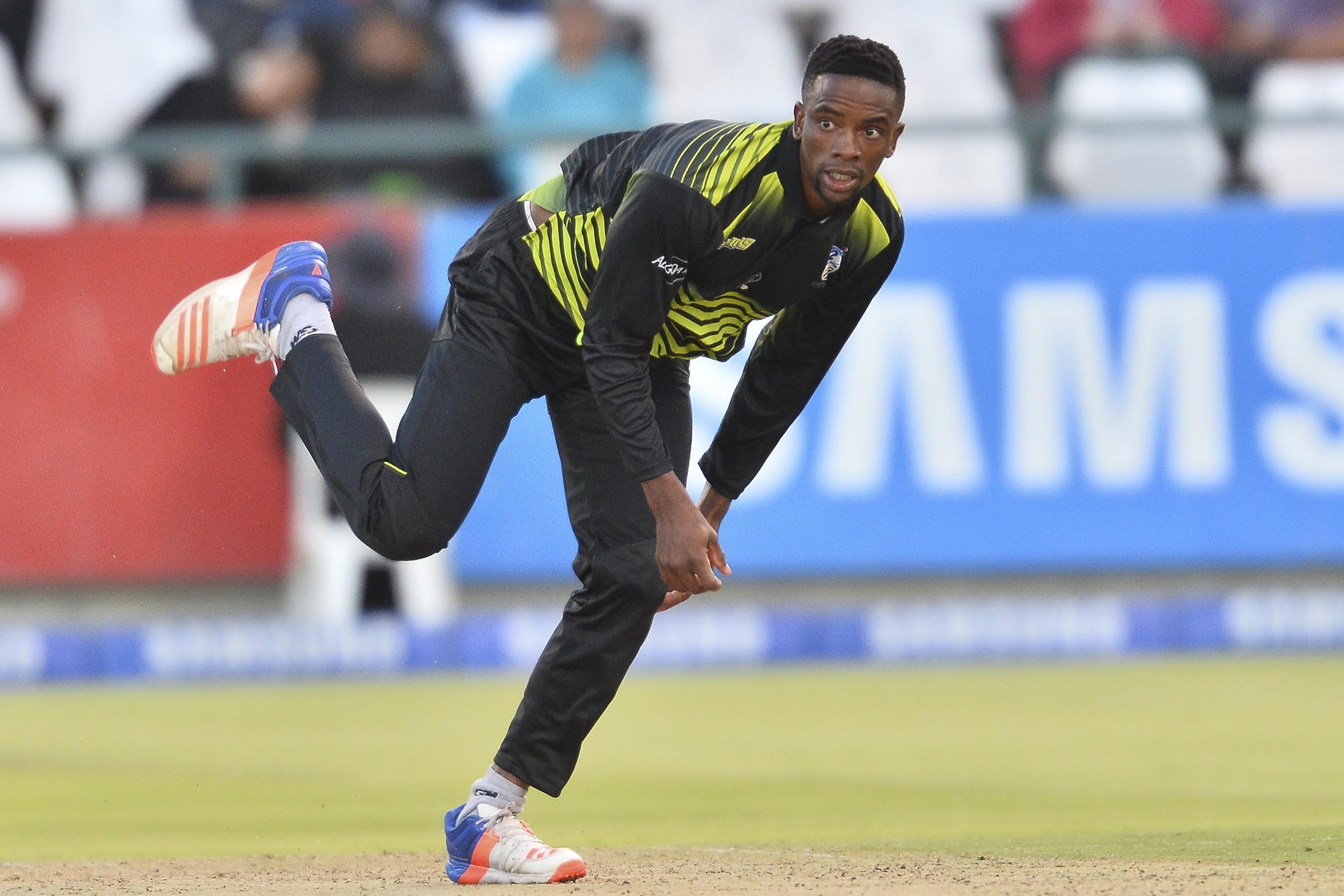
And then the potholes emerged
South Africa finished third in the event won by India, losing to beaten finalists Australia in the semis – but trounced New Zealand by eight wickets to claim the consolation prize. As the team packed their bags for the 15-hour flight home, Nqweni and a few others were instructed to make their way to the Australian Institute of Sport in Canberra.
“They didn’t tell us why,” he says. “We just did as we were told.”
In the Australian capital, Nqweni and his mates were joined by representatives of every other team. Under the watchful eye of scientists with clipboards, they performed a series of physical tasks. Running towards the wicket. Gathering in their action. Delivering ball after ball until the scientists were satisfied.
Weeks later, Nqweni was leading the attack for Eastern Province, the provincial feeder team for the Warriors franchise. In early October, he took four wickets against KZN Inland in a 10-wicket win. In the next round, he claimed 7/48 against Coastal, including the wickets of the top five batsmen, in a rain-affected draw. A comparatively barren return against Boland followed before a first innings 6/44 against Western Province set up another 10-wicket win in Cape Town on 3 November.
Makhaya Ntini bowled his last ball in competitive cricket in March 2013, in a domestic game, and Nqweni began dreaming big. “I believed I had what it took to replace a legend.”
Related article:
Hanging out with friends on his favourite beach, the ring of his cellphone punctuated the din of the Indian Ocean. “I thought it was the call I’d been waiting for. I remember feeling that I was about to make the step up.”
Niels Momberg was on the line. Cricket South Africa’s (CSA) manager of youth and tertiary cricket had some bad news. The scientists in Canberra had found an irregularity in his action. Both he and his SA Under-19 teammate Prenelan Subrayen would have to undergo supervised rehabilitation. Until they had straightened their elbows, they could not play the game they loved.
“I was stunned,” Nqweni says, remembering the hollow, sinking feeling after that call. “I was on the verge of an important Under-19 series against England. I was playing my best cricket. It was such a shock. I’d played on TV before and no one had ever told me my action was dodgy. It made me think that every time I was about to experience something amazing, something terrible would happen.”
This sense of foreboding permeates Nqweni’s story. But he did not dwell on his insecurities. Instead, with the help of Adrian Birrell, Vincent Barnes and other high-ranking coaches within the CSA, he dismantled the action that had brought him to the cusp of realising his ambitions and sought to rebuild it.
The human body was never meant to bowl a cricket ball. The unnatural contortion of muscle, tendon and bone is a middle finger in the face of biological evolution. Most fast bowlers exert around four times their body weight on their ankles, knees and hips through their delivery stride. For some, it can be as much as eight times. Lower back injuries are a scourge. Side strains are a perennial problem. Hamstrings and cruciate ligament tears are hazards of the trade.
It is the thrill of hurtling a 163g orb at a frightening pace that keeps these speed junkies coming back. This is an exclusive club, but anyone is welcome as long as they keep to two concrete rules: bowl fast, and do so without your elbow bending beyond 15 degrees.
Family secrets
Nqweni spent a year in the wilderness. He still had a professional contract but had lost his speed. Sometimes the ball would bounce twice before it reached the batter 20m away.
“I’d dread going to practice. I’d cry on my way there. It was embarrassing. I used to be a strike bowler. Now people would look at me with pity. I felt out of place. I didn’t feel like I belonged.”
He almost abandoned the sport entirely. He was 20 years old and had encountered a major stumbling block along a route that had long been mapped out for him. Eastern Province retained their faith and kept him on their payroll. Rather than quit, Nqweni would be a student first and a cricketer second, playing for Nelson Mandela Metropolitan University (NMMU) – now Nelson Mandela University – when not completing his law degree. Perhaps he’d rediscover his mojo, perhaps not.
Related article:
Nqweni does not come from a sporty family, or so he thought for the first 13 years of his life. His “father” Robert was a school principal for 30 years and his “mother” Zinzi has a PhD in clinical psychology. His older sisters “don’t have an athletic bone in their body”, he says, although they are all successful in their respective fields. His athletic gifts were seemingly bestowed by a higher power, separate from any inherited strand of genetic code.
But one day, when he was old enough to grasp the concept, he was told the true dynamics of his family. His parents were not his parents, they were his grandparents. His older sister Zandile was his mother.
“It wasn’t like we told him otherwise,” says Zandile, who had Nqweni when she was 17. She is a little taken aback by the question but is happy to share this intimate thread of her family’s narrative. “We never felt the need to demarcate roles. Maybe he sees it that way because we all called my parents mom and dad, and we treated him in many ways like a little brother.”
Nqweni remembers it differently. “It was dropped on me. It was mind-blowing at the time. But it didn’t change anything between us. My parents have always been my parents. I have the same connection with my mother and aunts as I always did. What it meant was that I had all these questions.”
Nqweni’s biological father was a talented basketball player and is now considered the source of his son’s sporting prowess. As the story goes, Smilo Kame represented Eastern Province and the national side. The details are hazy, but he had enough talent to train with the Harlem Globetrotters in the late 1990s, when the exhibition team from the United States toured South Africa.
The inopportune loss of his father
Kame never made the most of his talent. Zandile says he lacked the drive to complement his potential. He certainly didn’t have the will to be a present parent. For whatever reason, he wasn’t around much when his son was growing up.
“I started seeing him more when my cricket took off,” Nqweni says. “He’d come to my school matches and cheer for me. I questioned his intentions. It was awkward. I’d go up to him and I didn’t know what to say. We never hugged once.”
Just as father and son were beginning to forge something resembling a relationship, Kame was shot and killed outside a bar in Port Elizabeth. Again, the details are hazy. The case is still open.
Nqweni thinks this is another example of life doling out harsh treatment just as things were looking up. He doesn’t try to explain away his misfortune. Simply bad luck, and a chance to grow.
Related article:
Zandile calls her son a boomerang. “His story has taught me what is important in life,” she says, almost exploding with love and pride. “I try to avoid conflict and tension now. I don’t have to be right in arguments. I value the relationship more. You can wake up tomorrow and it could be gone.”
Nqweni had long bounced back from this early bump in the road and was on his way to getting over the second. His time at NMMU had given him perspective. Surrounded by students, his horizons broadened as he came to view cricket as something to be enjoyed rather than feared.
His new action denied him the zip through the air that gave him his sense of alphadom, but he worked with what he had. He developed a back-of-the-hand slower ball and figured out how to vary the pace of his bouncer. Different cutters were thrown in the mix and he could hit yorkers with more regularity. Rather than charge in to unleash erratic hell, he analysed the willow wielder across the pitch and adjusted his lines and lengths accordingly.
“It’s incredible how bowling in a different way changed my outlook on cricket,” he says. “I started working on my batting again and for the first time in years I considered myself a genuine all-rounder. It really felt like I’d rediscovered my love for cricket.”
Saved by England’s win
Nqweni’s critical thinking was rewarded with leadership duties. He became the captain of the Eastern Province 50-over side for the 2018-2019 campaign. In the final of the three-day red-ball competition, he hit 95 in the first innings against Northerns in a drawn match that was enough to see the province claim the title for the first time since 2010.
With a successful season under his belt, he accepted an offer to spend five months in east Scotland as one of Aberdeenshire Cricket Club’s overseas players for 2019.
He flourished over 10 matches, averaging more than 40 with the bat and less than 30 with the ball. It was the first time in his life that he had lived for an extended period outside the Eastern Cape. He was happy. He was healthy. Then his world changed.
“People think I’m pessimistic when I get uncomfortable when good things start happening to me,” he explains. “The truth is, I’ve been burnt too many times. As soon as everything’s looking good, I expect a sudden crisis.”
It began on the day of the 2019 World Cup final. England were playing New Zealand at the Home of Cricket. The day before, Nqweni had put in a heroic shift for Aberdeenshire. He’d bagged a couple of wickets across 10 overs, then went down swinging his bat in a losing cause, having eked out 59 runs in a marathon knock. He was knackered and looking forward to spending his Sunday perched in front of a television with his mates.
He woke up tired from the previous day’s exploits. Nothing a cup of coffee couldn’t fix. But something was off. His hand couldn’t quite grasp his mug, his fingers were limp and his wrist lacked any strength.
Mackaness chalked this down to dehydration. The United Kingdom was experiencing a relatively hot spell and Nqweni’s efforts on the field must have taken their toll. An hour before England’s Chris Woakes would bowl the first ball of the final, Nqweni opted out of the original plan to watch with Mackaness at a bar.
The next 102 overs will be remembered as one of the greatest days in cricket’s history. New Zealand’s score of 241/8 looked to be enough until Stokes filled the spotlight. His 84 not-out, aided by a once in a lifetime deflection off his bat that gifted him six runs, saw England tie the game in regulation time. The thrilling contest was decided by a Super Over. Six balls per team to score as many runs as possible. Both registered 15. Nothing could separate them, nothing but a boundary count. England’s 26 beat New Zealand’s 17.
Related article:
After the match, England captain Eoin Morgan told reporters that “Allah was with us”, echoing the reassuring words of his Muslim teammate Adil Rashid. So much of that unimaginable match now seems preordained.
“I thank God England won,” Nqweni says. “Had New Zealand won, I wouldn’t be alive. Callum would have definitely been out partying. He would either have still been out or he would have been too drunk to save my life.”
“He’s right,” Mackaness confesses. “Not necessarily about me saving his life, but definitely about me celebrating had the Black Caps won. I’m a proud Kiwi supporter. It was so painful watching us lose like that. It wasn’t fair. But in hindsight, I’m grateful.”
When your immune system tries to kill you
At around 8pm, Mackaness limped through the door with his girlfriend. His face was as long as Wellington is far away, but Nqweni was happy to see his close mate. They ordered a takeaway and watched a few episodes of Love Island on television.
Nqweni made a move to go to bed. His body did not comply. “Stop playing games,” Mackaness said. “I’m not,” Nqweni insisted. “I can’t move my legs.”
Consciously avoiding panic, Nqweni suggested Mackaness leave him on the couch. “We’ll figure this out in the morning,” he assured his friend. “I just need to sleep it off.”
Nature called in the middle of the night. Nqweni stirred awake. The lower half of his body would not budge. He called Mackaness’ name but could not get a response. He hauled himself from the couch and leopard crawled towards his phone at the end of the coffee table. He knocked it over, sending it bouncing further beyond his reach. It was like a scene from a movie.
“I felt like Leonardo DiCaprio in Wolf of Wall Street,” he says. “You know, when he’s on drugs and trying to get to his car so he can drive home. That was literally me.”
Nqweni managed to reach his phone and call Mackaness, explaining the situation in a muffled voice. Half an hour later he was in the back of an ambulance, squinting at the bright lights as he struggled to comprehend what was happening. Before he lost consciousness, he called home to South Africa.
Related article:
The exact cause of Guillain-Barré syndrome (GBS) remains a mystery. Named after the French physician who first described the disorder in 1859, the disease affects around two in every 100 000 people each year. A sufferer’s immune system attacks their peripheral nerves, causing the rapid onset of muscle weakness. The outer limbs are the first to fail as the wave cascades in towards the vital organs.
Nqweni woke up two days later in an intensive care unit with head-to-toe paralysis. Only his eyes flickered, wide and filled with terror, darting around as doctors and nurses and loved ones bent over him, each face conveying the seriousness of his situation.
“I was a prisoner in my own body,” he says. “I had tubes in my mouth and I was attached to machines. I had no idea what was happening.”
He was stable for a week and had his condition explained to him. He couldn’t communicate but felt reassured by the news that around 70% of GBS sufferers make a full recovery.
Then another snag. His weakened lungs released latent tuberculosis that his body could not fight as a result of his diminished immune system. Soon after, his liver and kidneys failed, which meant he had to go on dialysis. He needed a plasma exchange. His lungs were bleeding. An emergency tracheotomy was performed to pump out the blood. The trauma to his body caused his heart rate to climb to 200 beats per minute.
Death as a constant companion
Nurses told his loved ones to say their goodbyes before doctors put Nqweni into a medically induced coma. No one knew if he would wake up.
For two weeks, he existed in a parallel dream world. He relates a “spiritual experience”, though he is unsure what was real and what was imagined. He recalls the sound of his own voice. “This is not how you die,” it said. “This is not the end of your journey.”
He remembers the face of Lungisani Ngidi. He would learn months later that the Proteas fast bowler donated some of his match fee from the past summer’s one-day international series with England towards his rehabilitation. “I saw him in a vision,” Nqweni says. “He’s never made this public and we didn’t speak about it. How crazy is that?”
Related article:
He woke up with questions. “Why is this happening to me?” and “What did I do to deserve this?” were two that prevailed. But soon the only one that occupied his thoughts was “How do I overcome this?”
For six months, Nqweni fought for his life at the Aberdeen Royal Infirmary. Death was a constant companion. Two people died in the same room of the intensive care unit while he was recovering. He assumed he would be joining them.
It was not just his life for which he was fighting. His existence was one of action and vigour and GBS had stripped him of his agency, reducing him to a shell of his former self. He remembers recoiling at the sight of his reflection in a mirror. “I was skin and bones,” he says. “I couldn’t look at myself.”
But he endured. He painstakingly relayed his needs through a communication board. A nurse would hold it up and tap on letters. When the correct one was reached, Nqweni would blink hard. T – O – I – L – E – T. It was a slow and difficult process, and he had to learn to temper his frustration.
Related article:
Like most GBS patients, he began making progress from the inside out. His ventilator was being dialled down constantly and eventually became unnecessary. He could soon crack jokes with visitors – including Stokes, who left a personal England Test shirt – and graduated to eating solid foods. His first proper meal was a full spread of Nando’s: half a chicken, peri-peri potato wedges and as many other sides as he could eat.
“No one ever had a better lunch in their life,” he says, closing his eyes in an attempt to relive the moment. “The next day was Domino’s [pizza], then sushi, then Five Guys burgers. We all take things for granted. I’ll never do that again. Every time I brush my teeth, I consider that a victory. Being able to speak is a gift we don’t consider enough.
“When I ask myself why this happened to me, I now have two answers. One is to learn to appreciate what I have and the other is to help teach others to appreciate what they have. I believe this happened for a reason. I believe I have a purpose in life.”
Returning home to another disease
After six months in Scotland, Nqweni was given the green light to return to South Africa. It was a gruelling and uncomfortable flight but a finish line of sorts was in sight. As usual though, a green light meant a pothole was ahead. This time he contracted Covid-19, he suspects from a used pillowcase in a Johannesburg hospital.
“After all that had happened, it was just one more thing. You never get used to these things but you learn to deal with it. I never got used to the way people would look at me like I was weak. I remember landing in OR Tambo airport and being in a wheelchair. This little girl looked at me with such pity. I remembered the feeling I had when I had lost my pace and I couldn’t reach the batsman. I’ve never wanted people to feel sorry for me. I’ve had to learn a lot about humility.
“I used to be one of the tallest people in my social circle. Now everyone stands over me. I used to be so independent. Now I need help in almost everything I do. But I’m not complaining, even though I’ve had low moments. I used to be so ashamed, I didn’t want anyone to know what was happening. Now I realise that my story can lift people.”
Nqweni’s Twitter and Instagram feeds are a combination of inspirational and heart-wrenching posts. He is candid about his struggles and encourages engagement on the videos he shares. There is one of him battling to speak and another of him moving his arms as if they were 100 years old. In a few he is smiling, but the tubes and hospital setting are a reminder that his is no ordinary tale.
One video in particular encapsulates his spirit. Posted on 4 August, we see Nqweni strapped to a small crane. He’s leaning forward and resting his arms on a table that is cranked higher and higher by a healthcare worker. He is then encouraged to move his skinny legs and take tiny steps. He is in pain but his eyes are those of a champion boxer before a fight. Determined, resolute, unyielding. It is the first time he has stood tall in months.
Every day brings him closer to a full recovery. Hydrotherapy twice a week is helping him carry his own weight when he walks. Physiotherapy three times a week helps strengthen his limbs. His fingers and toes are still unresponsive but they’ll come around eventually.
He’s started to think of ways he can give back to the game. He’s considering a life as an administrator or working with a franchise. The South African Cricketers’ Association, the union of professional players, has given him so much support over the past year and a half, and he’d like to return the love in some way.
That’s all part of Plan B. Plan A is to get back on the field. To feel his heart beat as he stands on centre stage with bat or ball in hand. To feel the weight of expectation. To command attention. To know that whatever he does next will change the outcome of the match.
He’s not sure if he’ll play again, but that remains his goal. “I’ve always wanted to be a professional cricketer,” he says. “Nothing has changed.”

